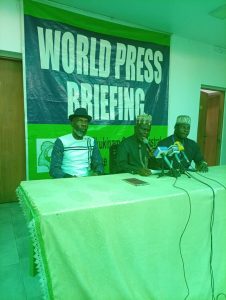
by Ọ̀gbẹ́ni Oláwálé Dáwódù
There’s a real sense of unease.
Underneath Nigeria’s shaky union, strong forces are gathering, threatening a major political mess. With 2027 getting close, it looks like folks are teaming up against President Bola Tinubu’s hope for a second term. The heart of this is a Northern power group that doesn’t want to give up control.
In Nigerian politics, power isn’t just influence; it’s how you survive. For the Northern bigwigs and political insiders, being in charge of the federal government has always meant getting their hands on national cash, having a say in important security and money decisions, and keeping the system that has been in place since independence.
If they lose this control, the North often acts like a bulldog with no teeth, loud and unpredictable, but desperate. Then comes a never-ending string of political tricks, sabotage, and behind-the-scenes moves, trying to take back what they think is theirs…the top job.
Northern Nigeria’s obsession with the presidency isn’t random. It comes from a long history that started in colonial times. The British, using their indirect rule, relied on Northern emirs to run the area, creating a culture of strong, central power and a sense of entitlement. When Nigeria became free in 1960, Northern leaders like Sir Ahmadu Bello and Sir Tafawa Balewa inherited this advantage and protected it fiercely.
Military takeovers, mostly started or run by Northern officers, were just another way the region held onto power. From Yakubu Gowon to Murtala Mohammed, Muhammadu Buhari to Sani Abacha, Northern Nigeria has produced most of Nigeria’s leaders. Along with them came a culture where they controlled resources, favored their own, and created imbalances that left the South, especially the South-East and South-South, feeling cheated.
Even with democratic governments, this pattern has mostly stayed the same, with Northern leaders staying in power longer or pulling strings from behind the scenes.
Bola Ahmed Tinubu becoming President in 2023 was not welcomed with open arms by the Northern political elite. Even though many Northern power players publicly supported his campaign, they were really just thinking about getting by in the short term, not giving lasting support.
Tinubu is what the North fears: A strong Southern leader with political organization, money, and smarts. He’s not just a Southern figurehead like those before him. He’s proven he can build alliances, use government resources well, and challenge Northern power with both words and actions.
From who he appoints to security positions to his economic changes and how he distributes resources, Tinubu’s presidency has started to change the way things work, loosening the North’s usual grip. And for a region that sees power as its right, this is not okay.
As talk about 2027 gets louder, a weird group is forming, made up of former Northern governors, retired military men, political opportunists, and unhappy allies, all quietly working to ruin Tinubu’s chances for a second term.
Their methods aren’t anything new.
From banditry in the North-West to conflicts between farmers and herders in the Middle Belt, they’re stirring up trouble to make Tinubu look bad.
They’re suddenly fighting against things like removing fuel subsidies and unifying the currency, calling them anti-people, while ignoring the decades of bad economic decisions that came before him.
Northern politicians and media folks are shouting for power to shift back to the North, even though the South has only been in charge for two years after Buhari’s eight years.
They’re pushing subtle but dangerous ideas to inflame old divisions, turning Christians against Muslims, North against South.
For years, the Southern regions have often reacted too late. From the annulment of MKO Abiola’s win in 1993 to the political isolation of Goodluck Jonathan in 2015, the story is always the same: The North is united, the South is divided.
The rest of Nigeria, especially the South-West, South-East, and South-South, needs to understand what’s at stake. Tinubu’s government, even with its problems, represents a big change in Nigeria’s power balance. If it’s cut short unfairly, it could make the North think that Southern leadership is something to put up with, not accept.
It’s time for the South to come together, not fall apart. Civil groups, political leaders, traditional leaders, and youth groups need to start talking about not just Tinubu himself, but the idea of fairness, rotation, and respect.
Nigeria can’t stay a country where power is kept through fear, manipulation, and regional blackmail. This cycle has to end, and it starts with facing the sense of entitlement that drives the North’s desperation.
The warning signs are there. The fear is real. And things could explode if the rest of the country doesn’t realize how determined these powerful groups are to keep playing their games.
May Nigeria do well, but only if it’s built on justice, balance, and true federalism.



